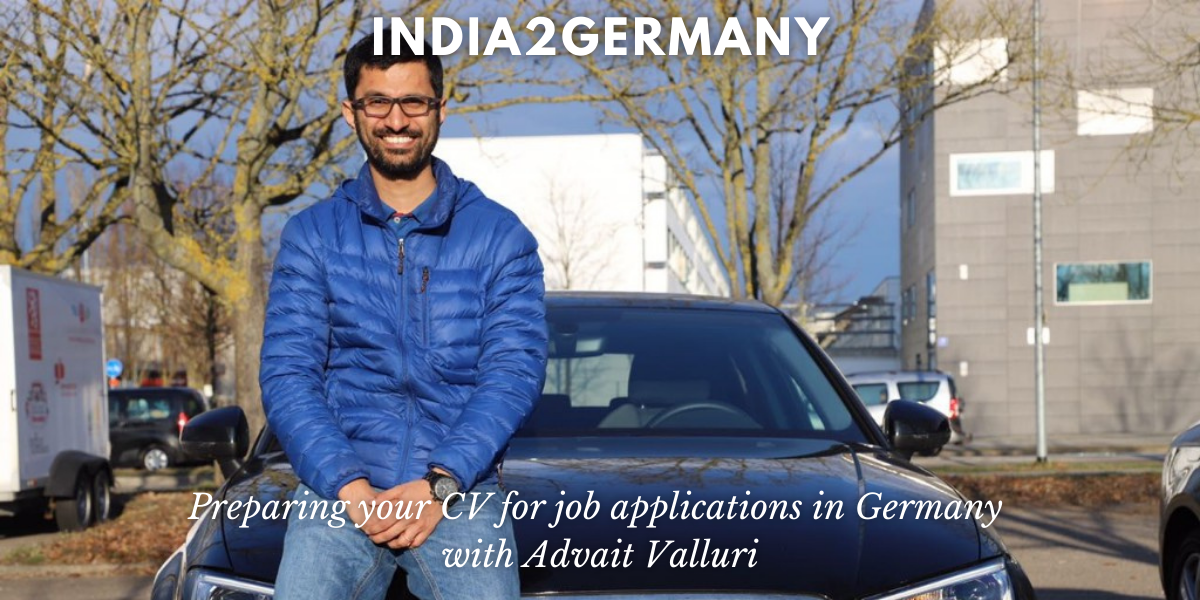
Montessori school education in Germany with James Brennan, Deputy Head of International Montessori School Berlin
James Brennan is the Deputy Head of the International Montessori School in Berlin, Germany. He spoke with us about the Montessori method of school education, what its foundations are, what distinguishes it from other "traditional" approaches and how it supports the development of a child.
James Brennan is the Deputy Head of the International Montessori School Berlin. He has more than 15 years of experience in education and sports coaching and has worked in various schools in different parts of the world. He spoke with us on a crucial aspect of living in Germany, namely school education. James explained to us the foundations of the Montessori method of education, what distinguishes it from the "traditional" approach to school education and how it supports the development of a child.
Hit Play to listen to this conversation and Follow to get notified about upcoming episodes.
Note: If you would like an overview of how the school system in Germany works and how to register your child at a school of your choice, check out our previous article (link below).

James, you have more than 15 years of experience in education and sports coaching working in different parts of the world. What is it that brought you to the International Montessori School in Berlin?
In terms of coming to Berlin, I wanted to experience living in another European capital, learning a new language, and understanding a new culture. I've previously worked as a teacher in Australia, America, and England (where I'm originally from). I've worked at a number of international schools both English and bilingual German-English speaking. These schools mainly followed the Cambridge English curriculum. However, in the last few years, I’ve been interested in and studying about the Montessori school approach and I now work at the Montessori School in Berlin. So that's how I arrived at this school.
What are the foundations and special features of the Montessori concept?
To explain in a simple way, it has a few main features. The first one being that is child-focused. We think of the child first and try to have a perspective from their eyes upwards. So it’s a ‘bottom-up’ approach from the child where he/she connects with the teacher and their learning, as compared to the common ‘top-down’ approach where the curriculum is based on standardized tests for all the children at the same time.
The second aspect is that classrooms have mixed age groups. For example, in our international school in Wannsee we have children from grade one, two, and three, in the same group, so they are 6, 7 and 8-year-olds together. And then we have the grades 4, 5, and 6 students, where we have mixed 9, 10, and 11-year-olds together. The younger children can learn from older children and see their next learning steps. So they can look at the older children and think, okay, in a couple of weeks that could be something I could try. And they can visually see their next learning, which is very powerful. For the older children, it gives them lots of time to learn the social skills of teaching others, and also to reflect on their own learning so they can go back and revisit a concept and this helps cement it in their long term memory. So this solidifying of concepts is very important in Montessori.
It's not a race from a 100-meter sprint from A to B, rather it is an approach where children can go back and relearn something that they can reteach other children eventually. And this is a very natural way that humans learn because we forget maybe 20% of what we learned. So when we go back, then we can recap. And that helps us.
How does Montessori method support the development of a child?
The benefit of this approach is that the children are working on their current individual level. We have children coming from different parts of the world, for example, from Hong Kong, Australia, and also kids who have a German background. The focus is always laid on their actual learning level. We don't expect these children to suddenly do textbook five in German if they've just arrived in Germany.
Another benefit is, for example, a child in grade one who is quite advanced - If they could already do, say their 12 times 12 timetables, then they don't need to wait for all the other grade one children before they can go to the next task. They can be given a harder task once they've mastered the 12 times 12. This way, you can extend the learning much faster and those children who are very quick are not held back, whereas children who need a bit more time can have an extra two or three days to learn the concept properly. This is really beneficial for the children because we talk about learning jumps and springs. The child might need two or three more days for that to happen. And they're given this time, so that their learning actually takes place and it doesn't have holes or gaps, where they're trying to just jump in where they are trying to keep up with the other children.
The last part that's very good is that we are not confined by an average standard. So, for example, if you say, 7 year old students must do this, or they can only do this, we can actually think above that. If a 7 year old student is particularly gifted, then they can push beyond and they can work with the eight-year-old and nine-year-old students, and they can always be pushing themselves further with a new challenge.
What do you do if a student is only interested in certain subjects but does not want to take up and read other subjects, e.g., Mathematics, by themselves?
That's a very good question and one that we often hear. Firstly, I would say, in the Montessori approach, we don't view learning as solely separate individual subjects. Math, Science, and English are not restricted to be taught in blocks of time of one hour, one hour, and one hour. Instead, we view learning more holistically, so it’s more of an integrated approach. For example, we use topic-based learning, along with lots of group projects, whereby all the subjects are needed to complete a task. So a child might need some Math skills, some English skills and some German skills to help complete that particular task. This way, we can offer a balanced curriculum, but they're using these skills when they need them and not just because the clock says 9 to 10 o'clock. This is a more natural way of learning, which is nice for children.
Secondly, the personalized learning of each student is taken into account. For example, if student A was particularly interested in horses, and student B was particularly interested in dinosaurs, then we can use this initial motivation to help drive the learning. For example, both students could learn about the different body parts of the creature, the history of the creature, they could write some stories about them, they could research maybe the food chain, or the evolutionary history of the creature. This way, they can be doing some Math, some English and German, and projects based around their interest. This would not only cover their skills but would also keep their motivation high which produces better results than 20 children doing the same project about unicorns, if you know only three of them are actually interested in unicorns.
We also have a Student Skill Book we use with the children. This has Maths, English and German, and the project works in different areas. We always refer to these skill books every couple of weeks. I will talk more about this later.
Do students get graded in Montessori schools?
Normally, in Montessori, we don't view children as numbers, or like 1 to 100 or A,B,C or even 1 to 6, in Germany.. So we don't give out official grades to the children. Even on their reports, we use handwritten statements. For example, Tom can count 1 to 20 in Maths..
However, when children do a presentation or a group task, we do have an observation sheet that we use, and we give them our grades as a teacher and we keep this information for ourselves. We use this as more of a progress-check to see if they can do the skill, rather than putting the skill into 1 to 6, which is the grading scale in Germany. So, we view the children more in skill development than in terms of numbers and grades.
How do you give feedback to students on their progress?
We don't like to rank the children as the best in the class and the worst in the class. We see every child has different levels. What we use is a Student Skill Book. Within this skill book, we have the main competencies or skills they need for the year level. So, for example, for a year one student, we might have a written statement that says, I can visually and verbally show my ability to count to 1 to 20. So that's the skill. We give the children a chance to show that in different contexts. So they could verbally say that via podcast, or speaking with the teacher, they could visually draw that, or they could make it from materials. So they have different ways to show their skill.
Once they've shown their skill, then the student and teacher have one-on-one conferences every three or four weeks, where the student sits with the teacher, and they go through some of the skills, so two or three skills they're working on. The student then has time to show the teacher they can do that skill. These one-on-one conferences are very powerful, because you can reinforce if there's a misunderstanding, and the children can then also show the teacher without the pressure of a test, that they know their skill.
The last thing, what we like to do is, once a child has mastered a skill, then we get them to reteach it often to a younger child. This process of re-teaching a skill is based on the principle that if you can teach someone else a skill, then we know you've mastered the skill and it will actually stay in your long-term memory, and not just be learned for five weeks for a test and then forgotten about, which is sometimes common in other school systems. So this is also very powerful for the children.
The last thing with the Skill Book is that we have children with the same teacher for three years. So they work through this skill book for three years. So they know where they're heading, and what skills they need to do. This can be very insightful. If the child is struggling in a certain aspect, then the teacher can be aware of this, and the children can have more time on this aspect. We can make special materials to help with this special aspect, which stops them from getting frustrated or hitting a brick wall with their learning.
You mentioned that in the Montessori system, learning takes place across multiple classes. Does this not place special demands on the teacher?
You would think it would be very difficult for the teacher. After all, there are so many different children at different age levels. But actually, the Montessori teachers have been trained in this aspect. Their main goal is to prepare the learning environment. So by that, I mean the classroom is prepared before the children come in. The teachers and the students know the materials very well and they know the next level of a material. So for example, when the children have mastered counting from 1 to 20, then the student can be shown the next material by the teacher like counting from 20 to 100. Then the teacher will show the student for one or two days, and then let the student have some practice time with these materials. Then the teacher can go to another student, and look at their level. The teachers are like an informed guide on the side. They move around the classroom looking for the learning leaps, or the learning sprungs as we call them in German. When they see a student is close, they can come over to the student and ask them some questions and see if the learning jump has taken place. So this way, the teachers are freed up from just standing at the front of the classroom for 40-50 minutes giving lots of presentations. They can capture the real in-the-now learning. They can see this child's just about to be ready and now I can come over and ask my question. That's the real time the children need help and that's much better than 30 children, only 3 of them listening to a presentation while the other children are looking out the window or saying I already know this, why do I need to do it again?
Is a Montessori school suitable for every child or rather something for smart independent learners?
That's a very delicate question to answer. Every child is slightly different. Often, when a child comes to our school, they can develop these skills. But mainly, we look for three key traits that if children have, it helps them.
The first one would be, as you mentioned, if the children are independent learners. If they finish a task, they won't just be happy to count, say, 1 to 10. They’ll think that now I want to count from 10 to 20. So they have that inner drive to push themselves to the next challenge. But the teachers also can teach that to the children, because they can quickly show them the next step and say, see this is the next phase, would you like to try or you can have two or three days to try. If a child doesn't have that, that's one of the things we try to develop.
The next thing would be the children who don't give up easily. So we always enforce the concept that making mistakes like trial and error is a very valuable process of learning. So for example, Thomas Edison, the man who invented the light bulb, I think he did 1000 tries and he said, every time when he got something wrong, he learned something new. And that helped him; he didn't just give up. So we try to develop an ‘I can try again later, I could try tomorrow’ attitude. This persistence helps the children. But if they don't have that when they begin, this is something they can quickly develop because the other children in the class have been shown this persistence, and they can model that behavior for the new children.
I would also say, another thing I notice, especially in the modern fast-paced world we live in, is that children who have the self-confidence to make eye contact with other people and the teachers and to have empathy for others. A big part of Montessori is to have empathy to help other children. So these are the three areas that we work with on a daily basis with the children: to have this core inner drive to improve, to have the confidence to take risks, and see failure as learning and not as a mistake. We have different children who come and we have good results with 99% of them, I would say.
Lastly, one very important aspect is the mindset of the parents. I always talk with the parents that they have to have an open mind-set and see learning as a journey. It's not just from A to B, but there's a little side road, or we might spend two or three days here, and that we're looking to foster the interest and curiosity of the child. If parents have a kind of fixed mindset, if they see learning perhaps only as marks on a test, or that they need these results to get to the next level of education, then that mindset is not so well suited to Montessori. This is normally the difference between the parents and students that come to our school, and the ones that maybe are better suited to a different learning structure. We always speak about a triangle of the parents, the teacher, and the student. The triangle needs to be connected and be thinking similarly and that helps in the development of everybody.
We are sitting in this beautiful historic building of your school, the International Montessori School, in such a beautiful area of Berlin called Wannsee. What is the significance behind the name of your school?
The International part is due to the fact that our learning community - our teachers, students, and parents are made up of a variety of people from different countries and cultural backgrounds. This is an aspect I really enjoy about our school. We like to celebrate the diversity and we often do cultural project weeks, whereby the families are invited to come into the school and share their knowledge about their culture. They might read some stories with the children. They've taught us some different dances and they always bring in some nice food, which I particularly enjoy. It's just a nice way for the children to learn from different people and cultures.
Your school is also a bilingual school. How important is it for a child to know German or English to find a place in your school?
In general, it's better if the students have at least a basic understanding of English or German before they start, for example, Can I go to the toilet? or Stop! That's dangerous!, so just a basic understanding. This helps them in the first couple of weeks to integrate with the new students and teachers. However, we have had students from Spanish-speaking backgrounds that didn't speak any English or German, to begin with. But within six to nine months, they all got to a good level. Both these students were very motivated and the parents helped them at home. I sent them some learning CDs and some extra work. So it is possible for children who don't have English or German to come to our school. If they have the right attitude and determination to learn within the first year, then they can successfully work in English in German. We have a special German program for non-German speakers. For instance, we have some students from Australia and America that come. They go to a special group to learn German, like a beginner's group, so they're not under pressure to compete with the native German children on a test or something. Also, we have some German students who are beginning in English. So they are grouped in different English groups. So we put the children in the groups based on their needs and their learning level. So then each child learns the second language at the right pace and is not pressured by keeping up with the other children.
Does your school have any additional focus?
Our secondary focus in this school is nature and outdoor education. We're very lucky, we have two qualified nature educationalists who take the students every week to the forest, which is just a one-minute walk from the school. There they learn about the plants and the local environment and the birds and the trees, etc. We also have a lake, which is a two-minute walk from the school. There we bring the children to learn about the pollution of the water and also for our art lessons. It's a nice place, it's an inspiring place for them to draw their pictures and be surrounded by nature. We also have our vegetable garden; each class grows their own vegetables and learns about the cycle of the spring and wintertime, etc. So nature is our main secondary focus.
Since the International Montessori School is a primary school, how do transfers to secondary schools occur?
In Berlin, there are a wide variety of state and private secondary schools, some Montessori ones, and some that have a Montessori background. There are also bilingual international schools. These follow maybe the Cambridge English curriculum, but the children also learn German in parallel. These are good options for the kids. Our students from year six go to a range of these schools. Our goal as a school is to prepare the children to be flexible learners so that they can adapt to different environments. So while some choose to go to English-German international schools. They do very well there because their language level is good. Some continue with the Montessori approach. This way, they can follow their individualized learning and group projects. They're also very happy at these schools. Berlin has lots of good schools, I always recommend the parents to do their research, and make sure the school fits your child and your family. When the parents come to our school, this is also something we do; we take two days of hospitation with the children. Sometimes we take one extra week if we need to check a little bit more. Then we make sure everybody's happy with the decision, and that the student will fit our school and also that our school will fit their needs. That way when they begin then everybody's on the same page and the learning for the child is not hindered in different ways.
What is done during the hospitation?
We usually invite the kids for two days' hospitation. I personally do the hospitations because I view it so valuable to the school. The first day the children will be with me, I'll assess their English and German, some of their motoric skills, catching and throwing, their balance and coordination, their social skills, how they interact with other children. The second day, we'll place them in one of our classrooms for three hours from 9 to 12 o'clock, and then we'll view how they are with the other children, how's their connection with the teacher, can they understand the Montessori materials, etc. Based on this information, we can speak with a family and take the next steps if they're interested.
How can someone join your school?
We have open evenings where parents can come and visit the school. The parents can also email us and say we're interested in joining the school. They fill in a registration form and then we contact them back as soon as possible and say in the next three weeks, we have a hospitation and we'd like to invite you to come and then you can come and then we'll begin the process.
More information about the International Montessori School in Berlin can be found on the school's website.
📬 Subscribe to our newsletter to stay up-to-date! 👇
India2Germany Newsletter
Join the newsletter to receive the latest updates in your inbox.







